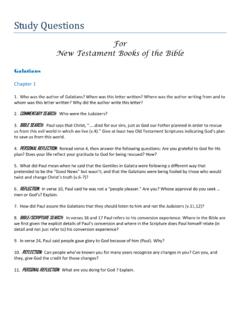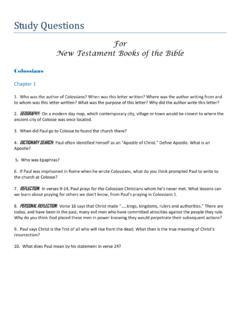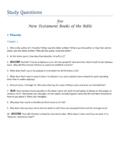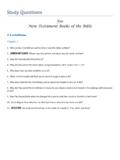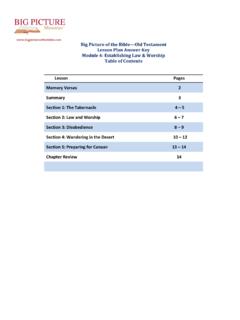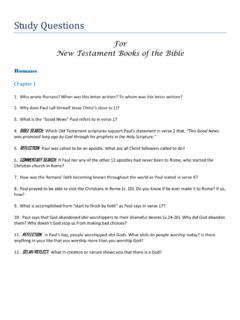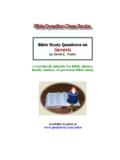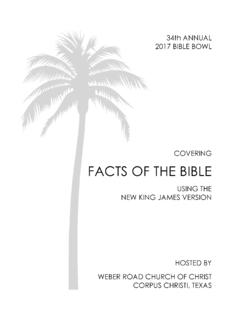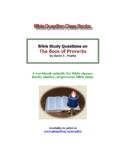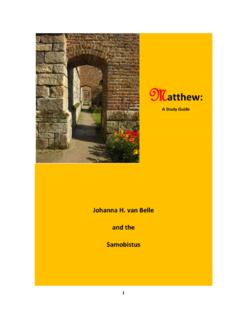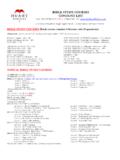Transcription of Study Questions - Big Picture Bible Study Guides
1 Study Questions For New Testament Books of the Bible 1 Corinthians Chapter 1 1. Who wrote 1 Corinthians and to whom was this letter written? (v. 1 2) Approximately, when was this letter written? Why did the author write this letter? 2. Bible SEARCH: Paul spent 18 months in Corinth during his second missionary and helped establish the church there. Where in Scripture is Paul's 18 month stay in Corinth documented? During Paul's third missionary journey, he spent three years in Ephesus and while there wrote this letter to the church in Corinth. Where in Scripture is Paul's three year stay in Ephesus documented? 3. GEOGRAPHY: In Paul's day, there was no postal service. Paul's letters were hand carried by people working with him in his ministry.
2 Locate the cities of Ephesus and Corinth on the map. Describe the possible route taken to deliver this letter. 4. HISTORICAL RESEARCH: Research the ancient cities of Ephesus and Corinth. Describe the cultural, commercial, and religious climates of these cities. 5. In verse 4, Paul thanks God for the gifts He had given the church in Corinth. What gifts is Paul referring to? 6. PERSONAL REFLECTION: Read verses 4 thru 9 again. Paul opened this letter and others with words of encouragement. Why was it important for Paul to do this? Do you know someone or a group who are in need of encouragement? If so, write or call them with words of thanksgiving and encouragement. 7. Who was Apollos and who was Peter? ( ) Read Acts 2:26 40. What message did Peter preach?
3 Read Acts 9:1 20. What message did Paul preach? Read Acts 18:24 28. What message did Apollos preach? 8. In verses 10 thru 17, Paul addresses a major problem that existed in the church at Corinth. What was the problem? How does Paul address the problem? Does this same problem exist today? Give examples. 9. Why did the message of the cross sound like foolishness to the Jews of Paul's day? Why did it sound like foolishness to the Greeks? ( 23) Why does it sound like foolishness to non believers today? Read 1 Peter 3:15. If you are a believer, how would you explain the message of the cross to a non believer? 10. DICTIONARY SEARCH: Look up the word wisdom in your dictionary. What does the word wisdom mean? Read verses 24, 25, and 30. Who is wisdom or the wisdom of God?
4 1 Corinthians Chapter 2 1. In verse 1 and 7, Paul refers to God's mysterious or secret plan. What is God's mysterious or secret plan? 2. Paul explains that his message to new believers was different from the message he preached to mature believers. What was the difference? Why did Paul make this difference? (v. 1 6). 3. REFLECTION: Is there a difference in the way you speak to new believers versus mature believers? If so, what is the difference? Why is it necessary to make a difference? 4. Read verse 9. What does this verse mean to you? 5. In verses 10 through 12, Paul explains one of the Holy Spirit's roles. Which of the Holy Spirit's roles does Paul explain in these verses? 6. Who gave Paul the words to explain spiritual truths? ( ) Who helps us understand spiritual truths?
5 7. Why can't non believers understand the spiritual truths of God? ( ) 8. What does it mean to have the mind of Christ? ( ) 1 Corinthians Chapter 3 1. In verse 1, Paul says when he was in Corinth he had to talk to church members as though they were infants. What did Paul mean when he said he had to feed them milk and not solid food? (v. 2) 2. What were church members in Corinth doing that proved Paul's point that they were not ready for solid food? (v. 3 4). 3. In verse 3, what did Paul mean when he said believers in Corinth were still being controlled by their sinful nature? Why were they still being controlled by their sinful nature? 4. PERSONAL REFLECTION: As born again believers, what things can we do to overcome the desires of our sinful nature?
6 5. In verse 6, Paul gives an analogy about seed. What is the seed in Paul's analogy? Paul said he planted the seed and Apollos watered it. What did Paul mean by this? Who planted the seed in your life? Who has watered the seed in your life? 6. In Paul's analogy, God makes the seed grow? (v. 7 8) How does this work? Why is it important to remember that God, not people makes the seed grow? 7. Bible SEARCH: In Luke 8:4 18, Jesus tells the parable about a farmer who planted seed which fell on four types of soil. What is the meaning of Jesus' parable? Seed falling on good soil produces a huge harvest. What kind of harvest are you producing? 8. In this same chapter, Paul gives another analogy about a building. In this analogy, who is the foundation?
7 Who is the building? Who are the builders? ( 12) 9. On judgment day, what will happen to builders whose work has value glorifying God? What happens to builders whose work does not have value? ( 15) 10. REFLECTION: What are you doing with your abilities and spiritual gifts to build up the church, the body of Christ? 1 Corinthians Chapter 4 1. In verse 1 thru 3, Paul explains that both he and Apollos are servants. Who were they working for? What was their job? Who will evaluate their work? 2. REFLECTION: How important is your boss' evaluations? How important is constructive or destructive criticism you receive from people here on earth? Who is your ultimate boss? Who will evaluate your work in the end? 3. Why are we not to judge our fellow Christians?
8 (v. 5) 4. What is spiritual pride? In what way was it creating divisions among believers in Corinth? (v. 6 7) 5. In verses 10 thru 13, Paul describes the hardships he had faced as a servant of Christ. What hardships did Paul describe? ( 13) 6. Why did Paul consider himself to be the spiritual father of believers in Corinth? ( ) 7. REFLECTION: In verse 16, Paul urges believers in Corinth to imitate him. What kind of example had Paul set for believers? What kind of example have you set? Why is it important for a believer to set a godly example? 8. In verse 20, Paul writes, For the Kingdom of God is not just a lot of talk; it is living by God's power. What did Paul mean by this? Why is it important for a believer not to just talk, but live by God's power?
9 1 Corinthians Chapter 5 1. Paul changes his focus to address a specific problem with sexual immorality that had gone unchecked in the church. What was the problem? (v. 1) What was the attitude of believers in Corinth about this issue? (v. 2, 5) 2. In verse 2, what did Paul urge the church to do about the problem he addressed in verse 1? 3. What does Paul mean when he says the man should be handed over to Satan? How would this help destroy the man's sinful nature? (v. 5) 4. REFLECTION: What happens to a church that allows blatant sin like the one Paul addresses in verses 1 thru 5 to go unchecked? 5. DICTIONARY & Bible SEARCH: What is yeast or leavening? In verse 6, Paul writes, Don't you realize that this sin is like a little yeast that spreads through the whole batch of dough?
10 What does Paul mean by this? Yeast or leavening is often used to symbolize sin. Find other scriptures where yeast is used to symbolize sin. 6. Bible SEARCH: Paul says that Jesus is our Passover Lamb. (v. 7) What happened during the first Passover? (See Exodus 12) What was the purpose of the Passover Lamb? In what way is Jesus like a Passover Lamb? 7. Bible SEARCH: What is the Feast of Unleavened Bread? (See Exodus 12) What does unleavened bread represent during the Feast of Unleavened Bread? In 1 Corinthians 5:8, what is represented by the words old bread? What is represented by the words new bread? 8. Paul told believers in Corinth not to associate with people who indulge in sexual sin. He then says he was referring to believers who indulge in sexual sin and non believers.
